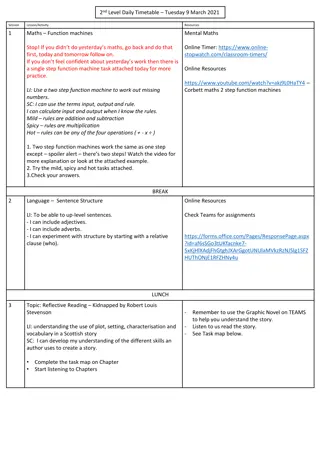
House Organization and Arrangement by Ischomachus
Ischomachus meticulously arranges and organizes his house, showcasing each room's purpose and functionality. From storage areas to living spaces, he explains the thoughtful design and placement of furniture and belongings. By delegating tasks to the housekeeper and emphasizing the importance of adherence to the household system, Ischomachus demonstrates a structured and efficient approach to managing a home.
Download Presentation

Please find below an Image/Link to download the presentation.
The content on the website is provided AS IS for your information and personal use only. It may not be sold, licensed, or shared on other websites without obtaining consent from the author. If you encounter any issues during the download, it is possible that the publisher has removed the file from their server.
You are allowed to download the files provided on this website for personal or commercial use, subject to the condition that they are used lawfully. All files are the property of their respective owners.
The content on the website is provided AS IS for your information and personal use only. It may not be sold, licensed, or shared on other websites without obtaining consent from the author.
E N D
Presentation Transcript
And how did you arrange things for her, Ischomachus? I asked. Why, I decided first to show her the possibilities of our house. For it contains few elaborate decorations, Socrates; but the rooms are designed simply with the object of providing as convenient receptacles as possible for the things that are to fill them, and thus each room invited just what was suited to it. [3] Thus the store-room by the security of its position called for the most valuable blankets and utensils, the dry covered rooms for the corn, the cool for the wine, the well-lit for those works of art and vessels that need light. [4] I showed her decorated living-rooms for the family that are cool in summer and warm in winter.1I showed her that the whole house fronts south, so that it was obvious that it is sunny in winter and shady in summer. [5] I showed her the women's quarters too, separated by a bolted door from the men's, so that nothing which ought not to be moved may be taken out, and that the servants may not breed without our leave. For honest servants generally prove more loyal if they have a family; but rogues, if they live in wedlock, become all the more prone to mischief. [6] And now that we had completed the list, we forthwith set about separating the furniture tribe by tribe. We began by collecting together the vessels we use in sacrificing. After that we put together the women's holiday finery, and the men's holiday and war garb, blankets in the women's, blankets in the men's quarters, women's shoes, men's shoes. [7] Another tribe consisted of arms, and three others of implements for spinning, for bread-making and for cooking; others, again, of the things required for washing, at the kneading-trough, and for table use. All these we divided into two sets, things in constant use and things reserved for festivities. [8] We also put by themselves the things consumed month by month, and set apart the supplies calculated to last for a year. For this plan makes it easier to tell how they will last to the end of the time. When we had divided all the portable property tribe by tribe, we arranged everything in its proper place. [9] After that we showed the servants who have to use them where to keep the utensils they require daily, for baking, cooking, spinning and so forth; handed them over to their care and charged them to see that they were safe and sound. [10] The things that we use only for festivals or entertainments, or on rare occasions, we handed over to the housekeeper, and after showing her their places and counting and making a written list of all the items, we told her to give them out to the right servants, to remember what she gave to each of them, and when receiving them back to put everything in the place from which she took it. , , 2-16 [2] , , , ; , . , , , : . [3] , , , . [4] , . , , . [5] , , . , . [6] , , . , , , . , , , , , . [7] , , , , , , . , . [8] , . . , . [9] , , , , , , : [10] , , , ,
. [11] , , . [12] , , , , . , . [13] : . [14] , , , , . , , , , , . [15] , , , , , , , , , , . [16] , , , , , , : . In appointing the housekeeper, we chose the woman whom on consideration we judged to be the most temperate in eating and wine drinking and sleeping1and the most modest with men, the one, too, who seemed to have the best memory, to be most careful not to offend us by neglecting her duties, and to think most how she could earn some reward by obliging us. [12] We also taught her to be loyal to us by making her a partner in all our joys and calling on her to share our troubles. Moreover, we trained her to be eager for the improvement of our estate, by making her familiar with it and by allowing her to share in our success. [13] And further, we put justice into her, by giving more honour to the just than to the unjust, and by showing her that the just live in greater wealth and freedom than the unjust; and we placed her in that position of superiority. [14] When all this was done, Socrates, I told my wife that all these measures were futile, unless she saw to it herself that our arrangement was strictly adhered to in every detail. I explained that in well-ordered cities the citizens are not satisfied with passing good laws; they go further, and choose guardians of the laws, who act as overseers, commending the law-abiding and punishing law- breakers. [15] So I charged my wife to consider herself guardian of the laws to our household. And just as the commander of a garrison inspects his guards, so must she inspect the chattels whenever she thought it well to do so; as the Council scrutinises the cavalry and the horses, so she was to make sure that everything was in good condition: like a queen, she must reward the worthy with praise and honour, so far as in her lay, and not spare rebuke and punishment when they were called for. [16] Moreover, I taught her that she should not be vexed that I assigned heavier duties to her than to the servants in respect of our possessions. Servants, I pointed out, carry, tend and guard their master's property, and only in this sense have a share in it; they have no right to use anything except by the owner's leave; but everything belongs to the master, to use it as he will. , 9-11 ( ) [9] , , , . , : , , , , . [10] , , . , , , . [11] , , , , :
, . 126-131: : , , . . . 139-141: . ' : . . 143: : ; ; : . . 152-155: : . : , : , . . 205: ; . . 379: .
Vitruvius 6.7 1. The Greeks, having no use for atriums, do not build them, but make passage-ways for people entering from the front door, not very wide, with stables on one side and doorkeepers' rooms on the other, and shut off by doors at the inner end. This place between the two doors is termed in Greek . From it one enters the peristyle. This peristyle has colonnades on three sides, and on the side facing the south it has two antae, a considerable distance apart, carrying an architrave, with a recess for a distance one third less than the space between the antae. This space is called by some writers prostas, by others pastas. 2. Hereabouts, towards the inner side, are the large rooms in which mistresses of houses sit with their wool spinners. To the right and left of the prostas there are chambers, one of which is called the thalamos, the other the amphithalamos. All round the colonnades are dining rooms for everyday use, chambers, and rooms for the slaves. This part of the house is termed gynaeconitis. 3. In connexion with these there are ampler sets of apartments with more sumptuous peristyles, surrounded by four colonnades of equal height, or else the one which faces the south has higher columns than the others. A peristyle that has one such higher colonnade is called a Rhodian peristyle. Such apartments have fine entrance courts with imposing front doors of their own; the colonnades of the peristyles are decorated with polished stucco in relief and plain, and with coffered ceilings of woodwork; off the colonnades that face the north they have Cyzicene dining rooms and picture galleries; to the east, libraries; exedrae to the west; and to the south, large square rooms of such generous dimensions that four sets of dining couches can easily be arranged in them, with plenty of room for serving and for the amusements. 4. Men's dinner parties are held in these large rooms; for it was not the practice, according to Greek custom, for the mistress of the house to be present. On the contrary, such peristyles are called the men's apartments, since in them the men can stay without interruption from the women. Furthermore, small sets of apartments are built to the right and left, with front doors of their own and suitable dining rooms and chambers, so that guests from abroad need not be shown into the peristyles, but rather into such guests' apartments. For when the Greeks became more luxurious, and their circumstances more opulent, they began to provide dining rooms, chambers, and store-rooms of provisions for their guests from abroad, and on the first day they would invite them to dinner, sending them on the next chickens, eggs, vegetables, fruits, and other country produce. This is why artists called pictures representing the things which were sent to guests xenia. Thus, too, the heads of families, while being entertained abroad, had the feeling that they were not away from home, since they enjoyed privacy and freedom in such guests' apartments. 5. Between the two peristyles and the guests' apartments are the passage-ways called mesauloe, because they are situated midway between two courts; but our people called them andrones. This, however, is a very strange fact, for the term does not fit either the Greek or the Latin use of it. The Greeks call the large rooms in which men's dinner parties are usually held , because women do not go there. There are other similar instances as in the case of xystus, prothyrum, telamones, and some others of the sort. As a Greek term, means a colonnade of large dimensions in which athletes exercise in the winter time. But our people apply the term xysta to uncovered walks, which the Greeks call . Again, , means in Greek the entrance courts before the front doors; we, however, use the term prothyra in the sense of the Greek . 6. Again, figures in the form of men supporting mutules or coronae, we term telamones the reasons why or wherefore they are so called are not found in any story but the Greeks name them . For Atlas is described in story as holding up the firmament because, through his vigorous intelligence and ingenuity, he was the first to cause men to be taught about the courses of the sun and moon, and the laws governing the revolutions of all the constellations. Consequently, in recognition of this benefaction, painters and sculptors represent him as holding up the firmament, and the Atlantides, his daughters, whom we call Vergiliae and the Greeks , are consecrated in the firmament among the constellations. 7. All this, however, I have not set forth for the purpose of changing the usual terminology or language, but I have thought that it should be explained so that it may be known to scholars. I have now explained the usual ways of planning houses both in the Italian fashion and according to the practices of the Greeks, and have described, with regard to their symmetry, the proportions of the different classes. Having, therefore, already written of their beauty and propriety, I shall next explain, with reference to durability, how they may be built to last to a great age without defects.
7 Sanders 1990






















